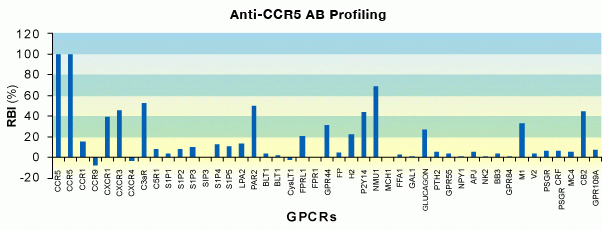Custom GPCR Antibody Profiling Services
Shorten the antibody lead development cycle
Antibodies are critical tools in research, diagnostics and therapeutics due to their exquisite specificity and sensitivity.
For example, research in target validation for drug discovery has relied on antibodies to identify proteins in a variety of assays including enzyme-linked immunosorbent assay (ELISA), cell-based ELISA, Fluorescence-Activated Cell Sorting (FACS), western blot, and immunohistochemistry (IHC).
In the past decade, significant progress has been made in antibody generation against G-protein coupled receptors (GPCR) including functional antibodies. However, producing high affinity and specific GPCR antibodies remains challenging. First of all, due to their complex seven-transmembrane protein structure, only limited small extracellular epitopes are available as antigens or for panning, Secondly, cross-reactivity is a prevalent issue shared among GPCR antibodies attributed to primary sequence and structural similarities among the large number of GPCRs encoded in our genome. To compound the difficulty, it is technically challenging and nuanced to develop and run cell-based assays to profile antibodies for on-target and off-target activities against GPCR targets. This applies to both functional and binding assays for GPCRs.
Multispan’s GPCR Antibody Profiling Service is where antibody engineers meet our GPCR assay experts.
It is designed to empower GPCR antibody clients with our extensive expertise in producing GPCR-expressing stable cell lines, developing binding and functional GPCR assays and conducting high throughput screening. To further add value and expedite timelines, our 500+ highly characterized assay-ready MULTISCREENTM GPCR stable cell lines are ready to be deployed at no extra cost to your clients.
The service will help uncover:
- Efficacy and potency of GPCR antibodies to the GPCR target in binding and functional cell-based assays
- Cross-reactivity to related and liability GPCR off-targets in binding and functional cell-based assays
- Comparison of human and ortholog GPCRs side by side
Turnaround time: 2 weeks
For Example...
We profiled a commercially available anti-CCR5 monoclonal antibody in our standard FACS assay for binding against a panel of 43 GPCRs including 5 other chemokine receptors. The assay was performed under non-permeabilized antibody staining conditions to measure only the extracellular binding of the antibodies to GPCRs expressed on the plasma membrane of HEK293T cells. The result illustrated below showed the widespread cross-reactivity including but not limited to other chemokine receptors. The Geometric Mean of fluorescence intensity of the CCR5 antibody binding is normalized for receptor surface expression with anti-Flag antibody staining for the common epitope tag of all GPCRs tested. This normalization step takes the uneven expression of different receptors out of the equation to allow data to truly reflect the binding of the CCR5 antibody to each GPCR target. A single concentration of the CCR5 antibody was tested. Binding potency to each GPCR can be obtained by follow-up profiling in dose-response curves.
Binding Non-Specificity of a Commercial Anti-CCR5 Monoclonal Antibody

A customized panel can be built and profiled for each program selected from our over 500 GPCR stable cell lines.
For therapeutic GPCR antibody development programs, specific functional assays can be selected such as target-induced Internalization, Calcium, cAMP, β-arrestin, radioligand binding, GTPγS, chemotaxis, cytokine secretion, and cell proliferation assays. Such assays can be performed with human and ortholog MULTISCREENTM GPCR stable cell lines side by side to determine if surrogate antibodies need to be generated for downstream animal studies. A functional assay panel can be employed to assess cross-reactivity against a group of related GPCRs from the same target family or standard liability off-targets in our 32-GPCR safety functional assay panel screening.
The quality of any data or antibody lead can only be as good as the assays used to select the antibody. Like other services Multispan offers, the GPCR Antibody Profiling Service represents quality and speed. There are 350 “druggable” GPCRs. Does your antibody lead specifically bind and activate or inhibit your GPCR target?
